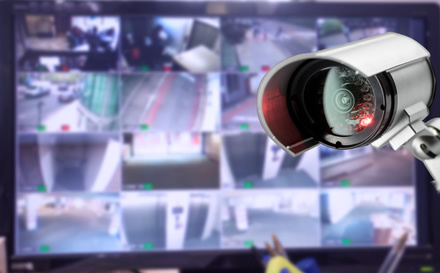Large Format High Definition Flatscreen Monitors May Not Be the Best for Security Monitoring
Before you go out and buy one of those impressive 42" high definition monitors so your San Francisco CA customers know you have a first class security system monitoring your San Francisco premises, think again. Large format HD monitors are able to deliver spectacular imagery, and with prices going down, they are quite popular. However, before you expend close to a thousand dollars on an impressive means of displaying your CCTV cameras, look at the facts.
Multiplexers, the devices that allow images from numerous cameras to be displayed on a single monitor, do not have high definition output. It is inevitable that this will change. But as of this writing, mulitplexers such as Bosch's LTC2682/90 and Pelco's Genex multiplexers that will allow up to 16 cameras to be displayed on one screen do not have the capability to display these images with enough resolution on a large screen. It is best to stay with a 20" screen, more or less, for the best viewing quality.
If you wish, you can drive a large format flatscreen monitor through the VGA out port on a DVR. The VGA output provides a reasonably decent image on up to a 32" screen. Any screen size larger, and the image starts to degrade. Another downside to having to drive the large format monitor from the VGA port of a DVR is that the screen becomes the monitor for the DVR's configurations and maintenance. Most DVRs have at least one separate monitor output that only passes the video images through. Using the VGA output should not be used for a public monitor unless you want everyone to be able to see a technician working on the configuration settings, or a manager reviewing video of a theft in San Francisco, CA. Of course, a video switch can be used to turn off the public monitor while work is being done on the DVR, but it's certainly not the best solution.
What is the best answer? Keeping in mind that CCTV monitors are specifically designed to receive the video signal from cameras, they should have at least one BNC input. So far, the large format HD monitors are not designed to CCTV specifications. As with most electronic technology, it's best to wait for high definition outputs on DVRs and multiplexers, designed for large HD screen sizes. A few are becoming available, like the Samsung STM-42L, but it's expensive at $3500. This writer will remain skeptical until he's seen it tested. In the meantime, use a 19" LCD flatscreen, or slightly larger, and if you need to keep 16 or more images viewable in a large enough window to provide monitoring, sequence the images using settings within the DVR or multiplexer. Use quads, if the images need to remain visible. The quad multiplexers split up to 4 cameras' views onto one monitor, and they are one-fourth the cost of a larger multiplexer. Then use as many monitors as necessary to display all the cameras.
For the time being, it is best to continue using smaller screen sizes for monitoring security cameras in San Francisco, CA. But it won't be very long before the prices come down on the large security camera monitors: notice how HDTVs have dropped recently. Of course, if you have more money than you know what to do with, go ahead. Just be sure the equipment driving the images can provide what the HD monitor can take. This writer is sticking with the smaller monitor sizes.

